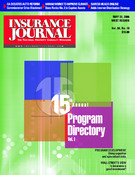News Currents
Alaska legislators concluded the 2006 regular session this month and in the final hours rejected a bill opposed by insurers that would have encouraged more employers to self-insure for workers’ compensation.
Legislators also declined to pass a measure that could have irritated more consumers than it would have protected from identity theft, according to Kenton Brine, northwest regional manager for the Property Casualty Insurers Association of America (PCI).
“On the session’s final day, lawmakers considered, but wisely rejected, legislation (SB 51) to create under-regulated and under-capitalized self-insurance pools for employers who would have put the safety and security of Alaska’s workers at risk,” Brine said.
Brine noted HB 51 would have allowed employers to join and self-insure together in order to provide benefits to workers injured on the job, rather than purchase workers compensation insurance from private carriers.
“PCI did not oppose the formation of self-insured groups, but we felt strongly that HB 51 and its companion, SB 241, failed to meet regulatory and solvency standards to protect workers in the event of a member or group insolvency,” Brine said.
“And we were not alone in our opposition. Both the state Insurance Division and Labor Department — the agencies mandated to regulate insurance and workers compensation coverage — strongly opposed these bills.”
Brine congratulated the Legislature on passage of SB 260, a measure by Sen. Ralph Seekins (R-Fairbanks), to continue the work of the Workers’ Compensation Task Force – a committee made up of legislators, agency officials and representatives of the health care, business and insurance communities in Alaska. The task force was created to study ways to reduce costs in the health care treatment delivery and payment system for injured workers, which today is the nation’s costliest.
“Finding ways to manage costs in the workers’ comp system, as has been done in California, resulting in a 40 percent reduction in workers’ compensation rates, is the best method to improve the cost of coverage in Alaska,” Brine said.
“By contrast, HB 51/SB 241 would have allowed some employers to simply ‘opt-out,’ which would have made insurance coverage less affordable and the market for less stable.”
Regarding the proposed identity theft legislation, SB 222, Brine said insurers sought to work in good faith with the business community, credit agencies and with bill sponsors.
The insurance industry offered pages of amendments that have been accepted in other states, amendments Brine said would have improved the law’s ability to protect consumers from identity theft and unauthorized releases of personal information without dramatically interfering with consumers’ access to their credit in order to make purchases or shop for insurance quotes.
“We applaud the efforts of Sen. Gene Therriault (R-North Pole) and Sen. Gretchen Guess (D-Anchorage) on this measure. And we appreciate how much they and their colleagues wanted to see a security breach and credit protection bill pass this year,” Brine said.
“Insurers hope to continue our discussions with other stakeholder industries and policymakers to develop legislation that will protect consumers and commerce at the same time — as we have been able to do successfully in other Northwest states in 2005 and this year.”
Working with PCI and its member companies, legislators and the state Department of Health & Human Services (HSS) also made improvements to legislation the state needed to pass in order to comply with new federal deficit reduction mandates.
HB 426 now requires insurers to cooperate with HSS in identifying claimants who are also on state medical assistance programs so the state can be reimbursed for losses covered by private insurance, but no longer requires the state attorney general to approve insurance settlements for auto, property and workers’ compensation claims.
“For the improvements in this bill, PCI must thank not only the Insurance Division and HSS officials, but most especially Rep. John Coghill (R-North Pole) — the bill’s sponsor — for their recognition of the original measure’s potential impact on claims settlement,” Brine said.
Brine noted, too, that a measure that would have interfered in the Insurance Division’s ability to enforce fair claims settlement practices died without a vote in the House. The bill, HB 350, would have allowed courts to intercede in cases where allegations of unfair claims settlement practices were alleged and levy fines without the consent of the insurance director.
“This measure would have harmed insurance consumers in the long run by causing delays in claims processing and would have undermined the authority of the state insurance director, while likely enriching plaintiffs’ attorneys who would be empowered to file more lawsuits alleging unfair practices to increase the value of claims disputes,” Brine said.
On the positive side, the Legislature approved a measure sought by insurers and supported by PCI to allow insurance policies and brochures to be provided to consumers in languages other than English. “Alaska’s rich and diverse culture is at the heart of this legislation, and PCI supported this measure’s passage,” Brine said.
PCI is composed of more than 1,000 member companies, representing the broadest cross-section of insurers of any national trade association. PCI members write over $184 billion in annual premium, 40.7 percent of the nation’s property/casualty insurance. Member companies write 50.8 percent of the U.S. automobile insurance market, 39.6 percent of the homeowners market, 33.5 percent of the commercial property and liability market, and 41.6 percent of the private workers compensation market.
Was this article valuable?
Here are more articles you may enjoy.


 How One Fla. Insurance Agent Allegedly Used Another’s License to Swipe Commissions
How One Fla. Insurance Agent Allegedly Used Another’s License to Swipe Commissions  Insurance Broker Stocks Sink as AI App Sparks Disruption Fears
Insurance Broker Stocks Sink as AI App Sparks Disruption Fears  Insurify Starts App With ChatGPT to Allow Consumers to Shop for Insurance
Insurify Starts App With ChatGPT to Allow Consumers to Shop for Insurance  A 10-Year Wait for Autonomous Vehicles to Impact Insurers, Says Fitch
A 10-Year Wait for Autonomous Vehicles to Impact Insurers, Says Fitch 


